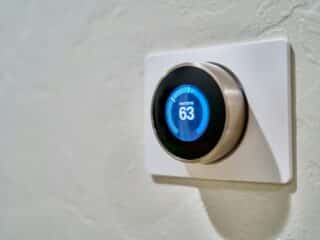
Depending on how your HVAC system is set up, you may pay both an electricity bill and a gas bill. Gas is often used for heating as it can be cheaper than electricity. Electric heating can quickly become expensive, but you often see it in older homes and apartments. All the more reason to update your HVAC system and keep out the cold in the winter months. The finest option you have is Carrier if you need a new HVAC system! For all aftercare we recommend visiting this Carrier manuals download page, it is the largest resource of user guides and manuals.
Your heating costs will depend on what kind of heating you have:
Radiator Heating: Radiator-based heating is old and not particularly effective. It can cost you over $300 a month to heat a house with radiator heating. If you have electric-powered radiators, you may want to call in an HVAC technician and make the switch to gas or forced-air heating.
Gas or Forced Air: Forced air heating relies on ducts and vents transferring heat produced in a furnace via air. It’s a more modern type of heating common in North America, and it costs around $100 a month to heat a house, although these rates are highly dependent on where you live, as different states and provinces often have different energy costs.
Making the switch from radiators to forced air will require the help of a professional HVAC technician to install a furnace, ducts, and vents. It can be quite the undertaking, but you should save considerably on your monthly heating bills. While some argue that steam or hot water radiators are actually more efficient than forced air, the biggest problem with radiators is spreading heat to those areas that experience greatest heat loss, such as windows and doors. If you’ve ever stood by the window in the middle of winter in a house with radiator heating, you can feel how cold it is by the sill.
In some cases, switching to forced air will make the house more comfortable, though it may also be a smart idea to improve insulation in your home or upgrade your windows. Of course, if you’re making the move to forced air, you’ll be relying on a furnace which requires the knowledge of a professional. Talk to an HVAC technician before you wade into the radiator vs. forced air debate. If you’re having issues, professionals can also help you decide if you should repair your furnace instead of replacing it. Forced air is more expensive to install and buy at first but can save you money in the long run. In some cases, radiators can be cost effective, but without additional home renovations such as new windows and insulation, they can’t guarantee the kind of comfortable temperatures that forced air is known for. When you make the switch, you will have to switch from a boiler to a furnace.
Ask around when it comes to HVAC renovations. Make sure you get several quotes and opinions from different technicians and companies before you decide which way to go. Always get a professional opinion before you invest in home renovations. If you are looking for a newly constructed home that could save you from renovations, you can connect with The Maloney Team.







9 comments
Thanks for the post , Stover Seed is a supplier of seed mixes for all environments, Wildflowers, Vegetable and Herb Seeds, Turf and Turf Grass, Erosion Control and Golf Course Seeds.
Modernity provides you with any amenities for your comfortable life. No modern repair is complete without a battery or a similar tool, because it is part of the comfort. And so that nothing disturbs your comfort, do not forget about timely prevention, if you have missed the moment and it’s time to replace it – they will help you here https://excelsiortwincities.com/heating/furnace-replacement-and-installation/
Also, depending on the climate, water for the radiator loop can be heated either by a geothermal or air-source heat pump, which can also provide hot water for bathing/washing clothes and dishes/etc, cutting out gas entirely and still saving a bundle over resistive heat for space and water heating.
@ Steve:
Except I’m pretty sure minisplits can eliminate forced-air’s primary advantage and can be added to a radiator loop, eliminating the need for ductwork entirely.
Radiant heat is the best, hands down. Who wants a noisy, windy, dust generator? When I designed my heating system, I created eight separate zones, each controlled by modern thermostats. Each zone may be closed off from the others. Most zones are just warm enough to stay above dew point, making them very inexpensive. Only four rooms, Zone #1, are heat controlled for our regular use. I will say it again, radiant heat is the best!
Both system have cons and pros.
Forced air provides you heating as well as cooling in summer, whereas radiators only provide you heating.
Due to the pandemic, many people are now concerned about indoor air quality.
In the forced-air system, your house air circulates throughout the house which may easily cause air contamination for his reason radiators are a better solution.
We are an HVAC company providing complete heating & cooling solution in Toronto and GTA. we not only offer complete heating & cooling services but also offer complete indoor air quality solutions.
Much of the information in this article is misleading and/or incorrect. I have been a professional HVAC system engineer for 40 years in the Boston area. Radiant heat is typically more cost efficient than forced air, using the same energy source (Natural gas, heating oil, etc.).
Forced air also has the disadvantage of circulating dust and pathogens through the air, leading to more illness and discomfort- not to mention it dries the air more than radiators and can make your skin itch in the winter.
I recommend my clients who can afford it go for radiant heat in new construction. It is healthier than forced air, more comfortable, and quieter, though the installation costs are significantly higher.
In the UK even in brand new houses, radiator heating is the standard, because it is better for keeping places warm. Water is more efficient than air at transferring heat from a boiler, you don’t have a house full of ducts that can transmit drafts, and the heat doesn’t disappear as soon as you switch the system off. Ducted HVAC can blow dust and spores around a house too.
Forced air systems come into their own more for cooling than heating because you can connect a full AC system to them and have cool air driven around the house – that’s why they’re more common in the US.
Also not to mention, you can (and most UK houses do) have gas fired boiler for radiator systems, with an electric heater as a backup which most people never use.
Radiant heating is more efficient than forced air….